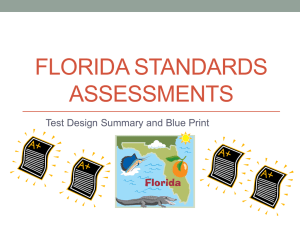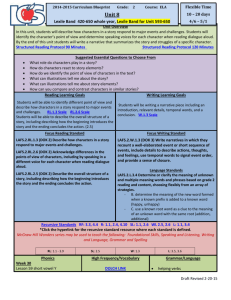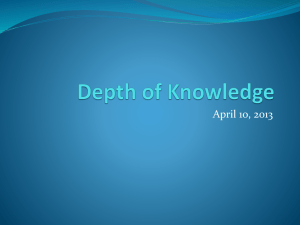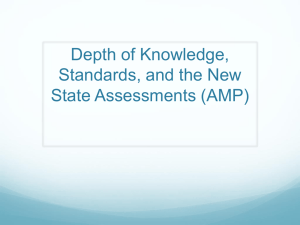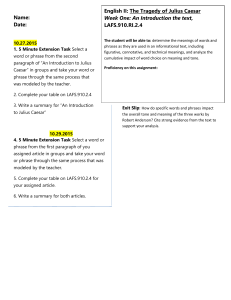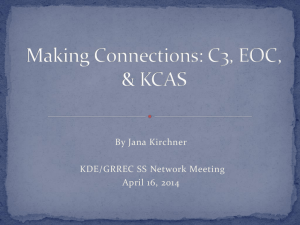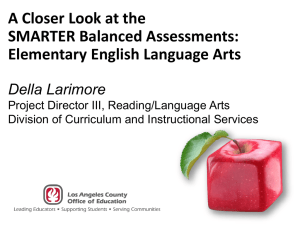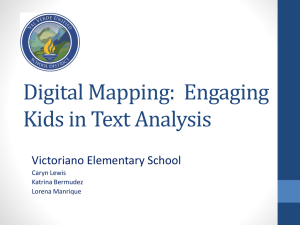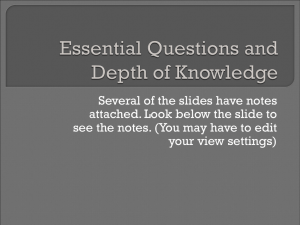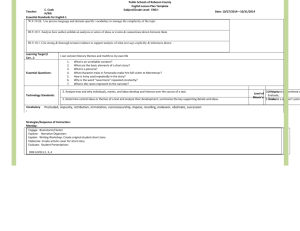MONDAY 8/31 TUESDAY 9/1 LESSON PLANS SUBJECT TO
advertisement
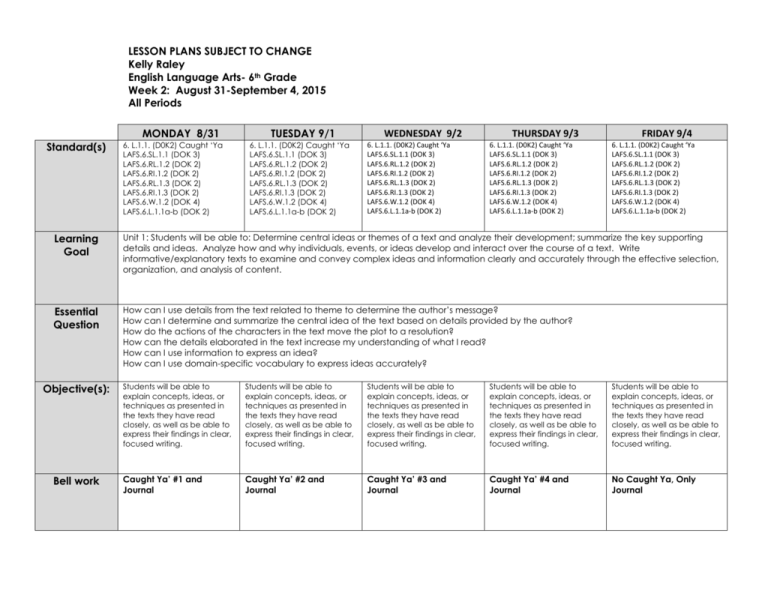
LESSON PLANS SUBJECT TO CHANGE Kelly Raley English Language Arts- 6th Grade Week 2: August 31-September 4, 2015 All Periods MONDAY 8/31 Standard(s) 6. L.1.1. (D0K2) Caught ‘Ya LAFS.6.SL.1.1 (DOK 3) LAFS.6.RL.1.2 (DOK 2) LAFS.6.RI.1.2 (DOK 2) LAFS.6.RL.1.3 (DOK 2) LAFS.6.RI.1.3 (DOK 2) LAFS.6.W.1.2 (DOK 4) LAFS.6.L.1.1a-b (DOK 2) TUESDAY 9/1 6. L.1.1. (D0K2) Caught ‘Ya LAFS.6.SL.1.1 (DOK 3) LAFS.6.RL.1.2 (DOK 2) LAFS.6.RI.1.2 (DOK 2) LAFS.6.RL.1.3 (DOK 2) LAFS.6.RI.1.3 (DOK 2) LAFS.6.W.1.2 (DOK 4) LAFS.6.L.1.1a-b (DOK 2) WEDNESDAY 9/2 6. L.1.1. (D0K2) Caught ‘Ya LAFS.6.SL.1.1 (DOK 3) LAFS.6.RL.1.2 (DOK 2) LAFS.6.RI.1.2 (DOK 2) LAFS.6.RL.1.3 (DOK 2) LAFS.6.RI.1.3 (DOK 2) LAFS.6.W.1.2 (DOK 4) LAFS.6.L.1.1a-b (DOK 2) THURSDAY 9/3 6. L.1.1. (D0K2) Caught ‘Ya LAFS.6.SL.1.1 (DOK 3) LAFS.6.RL.1.2 (DOK 2) LAFS.6.RI.1.2 (DOK 2) LAFS.6.RL.1.3 (DOK 2) LAFS.6.RI.1.3 (DOK 2) LAFS.6.W.1.2 (DOK 4) LAFS.6.L.1.1a-b (DOK 2) FRIDAY 9/4 6. L.1.1. (D0K2) Caught ‘Ya LAFS.6.SL.1.1 (DOK 3) LAFS.6.RL.1.2 (DOK 2) LAFS.6.RI.1.2 (DOK 2) LAFS.6.RL.1.3 (DOK 2) LAFS.6.RI.1.3 (DOK 2) LAFS.6.W.1.2 (DOK 4) LAFS.6.L.1.1a-b (DOK 2) Learning Goal Unit 1: Students will be able to: Determine central ideas or themes of a text and analyze their development; summarize the key supporting details and ideas. Analyze how and why individuals, events, or ideas develop and interact over the course of a text. Write informative/explanatory texts to examine and convey complex ideas and information clearly and accurately through the effective selection, organization, and analysis of content. Essential Question How can I use details from the text related to theme to determine the author’s message? How can I determine and summarize the central idea of the text based on details provided by the author? How do the actions of the characters in the text move the plot to a resolution? How can the details elaborated in the text increase my understanding of what I read? How can I use information to express an idea? How can I use domain-specific vocabulary to express ideas accurately? Objective(s): Bell work Students will be able to explain concepts, ideas, or techniques as presented in the texts they have read closely, as well as be able to express their findings in clear, focused writing. Students will be able to explain concepts, ideas, or techniques as presented in the texts they have read closely, as well as be able to express their findings in clear, focused writing. Students will be able to explain concepts, ideas, or techniques as presented in the texts they have read closely, as well as be able to express their findings in clear, focused writing. Students will be able to explain concepts, ideas, or techniques as presented in the texts they have read closely, as well as be able to express their findings in clear, focused writing. Students will be able to explain concepts, ideas, or techniques as presented in the texts they have read closely, as well as be able to express their findings in clear, focused writing. Caught Ya’ #1 and Journal Caught Ya’ #2 and Journal Caught Ya’ #3 and Journal Caught Ya’ #4 and Journal No Caught Ya, Only Journal Agenda Unit 1: Writing to Inform/Explain From Close Reading (Collection 1) Vocabulary Homework Ticket Out Accommodations Expected End Common Performance Task Teacher Review learning Teacher Review learning Teacher Review learning Teacher Review learning Teacher Review learning goals, objectives, and scales; Teacher/Student review expectations for writing the Baseline Prompt Student will begin Baseline Prompt goals, objectives, and scales; Teacher/Student will review expectations for writing the Baseline Prompt Student will complete Baseline Prompt begun on Monday goals, objectives, and scales; Teacher/Student will discuss vocabulary and introduce the topic of fear while reading Life Doesn’t Frighten Me. Student will play, “Would You Rather”, followed by beginning semantic maps on vocabulary with a shoulder buddy. goals, objectives, and scales; Teacher/Student will discuss Cornell notes Student will take Cornell notes on vocabulary goals, objectives, and scales; Teacher/Student will review “…and I quote” expectations Student will complete “…and I quote” worksheet with shoulder buddies Central idea, convey, detail, distinct, judgment, opinion, personal, summarize, summary, text, theme Read AR book Central idea, convey, detail, distinct, judgment, opinion, personal, summarize, summary, text, theme Read AR book Central idea, convey, detail, distinct, judgment, opinion, personal, summarize, summary, text, theme Read AR book Central idea, convey, detail, distinct, judgment, opinion, personal, summarize, summary, text, theme Read AR book Quote: She stood in the storm, and when the wind did not blow her way, she adjusted her sails. Central idea, convey, detail, distinct, judgment, opinion, personal, summarize, summary, text, theme Read AR book What did you learn What did you learn What did you learn What did you learn What did you learn today? today? today? today? today? Any questions or Any questions or Any questions or Any questions or Any questions or concerns? concerns? concerns? concerns? concerns? Where do you think you Where do you think you Where do you think you Where do you think you Where do you think you are on our scale and are on our scale and are on our scale and are on our scale and are on our scale and why? why? why? why? why? ESOL/ESE MODIFICATIONS: Multiple learning styles; Provide contextual support through models and demonstrations; Reinforce key ideas repeatedly; making use of contextual clues; multiple media; hands-on experiences; defining content area terms, thinking maps, classroom routines; use visuals and models, monitor students’ comprehension, give wait time, introduce new vocabulary, write directions on board; use document camera and projector with speakers when necessary. Accommodations: Extended time; test in small group; test in alternative setting; clarify assignments and directions; check for understanding; Inclusion Teacher assist Common Performance Task R.1.2, W.1.2 How does an author develop a theme or central idea? After reading the texts from this collection, write an extended response in which you explain how one author develops a theme or central idea about fear and the important role it plays in our lives through particular details. Support your discussion with evidence from the text. *Product may also be a full essay if appropriate
